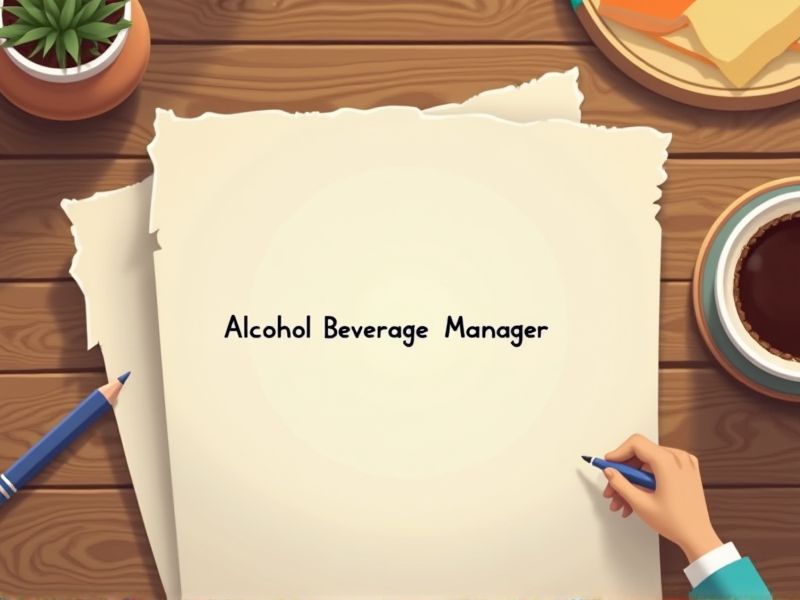
Alcohol Beverage Managers oversee operations involving alcoholic drinks, requiring them to navigate both regulatory and customer service challenges. Certifications ensure they understand legal compliance, responsible service practices, and effective inventory management. These credentials validate expertise and increase trust from employers and patrons alike. Some key certifications beneficial for an Alcohol Beverage Manager include:
TIPS (Training for Intervention Procedures) Certification
Acquiring TIPS Certification provides Alcohol Beverage Managers with the necessary knowledge to identify signs of alcohol-related issues among patrons. This certification equips managers with skills to implement effective intervention strategies, thus reducing the risk of alcohol-related incidents. Having TIPS certification often aligns with state regulations, reducing legal liabilities for establishments serving alcohol. Managers with TIPS certification enhance the establishment's reputation by promoting a culture of responsible alcohol consumption.
ServSafe Alcohol Certification
ServSafe Alcohol Certification is needed for an Alcohol Beverage Manager because it ensures they understand responsible alcohol service, reducing the risk of legal issues stemming from underage or over-served patrons. This certification educates managers on local and state alcohol regulations, which helps in maintaining regulatory compliance and avoiding costly fines. Training instills knowledge on recognizing intoxication levels and handling difficult situations, which can enhance customer and workplace safety. Holding the certification can lead to improved reputation and trustworthiness of the establishment, potentially increasing patronage and revenue.
Responsible Beverage Service (RBS) Certification
Responsible Beverage Service (RBS) Certification is crucial for Alcohol Beverage Managers because it equips them with the knowledge to manage the legal sale of alcohol and mitigate underage drinking. The training helps managers identify signs of intoxication and implement strategies to prevent over-serving, reducing the risk of alcohol-related incidents. Compliance with RBS regulations ensures establishments can avoid costly fines and legal issues associated with improper alcohol service. State mandates for RBS certification foster safer community environments by promoting responsible alcohol consumption practices.
Alcohol Server Education Certification
Alcohol Server Education Certification is needed for Alcohol Beverage Managers because it ensures they understand legal responsibilities and compliance with state and local alcohol laws. This knowledge reduces liability risks associated with improper service, such as serving minors or over-serving patrons. It equips managers to implement safe serving practices, promoting a safer environment for both patrons and staff. Certification also enhances the reputation of the establishment, as demonstrated knowledge in responsible service can increase customer trust and loyalty.
Certified Sommelier Program Certification
The Certified Sommelier Program Certification ensures an alcohol beverage manager possesses a deep understanding of wine varieties and the complexities of pairings. It enhances a manager's ability to create sophisticated wine menus that cater to diverse palates, leading to increased customer satisfaction and sales. Certification also establishes credibility within the industry, attracting both discerning customers and potential employers. Knowledge gained from the program empowers managers to train staff effectively, elevating the overall service quality in the establishment.
Food Handler Certification
When alcohol beverage managers undergo food handler certification, they gain essential knowledge about maintaining hygiene standards, reducing the risk of cross-contamination. This certification ensures managers understand safe food and drink handling practices, enhancing customer safety and minimizing health violations. In scenarios where food is served alongside alcohol, the risk of foodborne illnesses decreases due to informed handling. Compliance with local regulatory requirements often mandates such certifications, avoiding potential legal consequences.
OSHA 10-Hour Certification
The OSHA 10-Hour Certification equips alcohol beverage managers with essential knowledge on workplace safety, reducing the likelihood of accidents in environments that often involve potential hazards. By understanding safety regulations, managers can implement protocols to protect both employees and patrons, aligning with industry standards. This certification encourages a culture of safety awareness, which is crucial for environments where alcohol consumption can increase risk factors. Compliance with OSHA standards can also protect the establishment legally and financially by minimizing incidents and related costs.
Certified Hospitality Supervisor (CHS) Certification
The Certified Hospitality Supervisor (CHS) certification enhances the credibility of an Alcohol Beverage Manager by demonstrating a validated level of competency and professionalism in hospitality management. With this certification, managers gain improved leadership skills crucial for effectively overseeing team operations in alcohol service venues. The CHS curriculum addresses critical issues like customer service excellence and operational efficiency, which are essential for handling the complexities of alcohol service. The certification can lead to increased career opportunities and potential salary boosts, as it signals proficiency to employers and stakeholders in the hospitality industry.
First Aid/CPR Certification
Alcohol Beverage Managers often oversee environments where alcohol consumption can lead to medical emergencies. Having First Aid and CPR certification allows them to respond effectively to potential incidents like alcohol poisoning or accidents due to intoxication. Proper certification equips managers with the skills needed to stabilize individuals until professional medical help arrives. Demonstrating such preparedness can enhance the establishment's reputation for prioritizing customer and employee safety.
Business Management Certification
A Business Management Certification provides the skills necessary to efficiently handle complex operations in the alcohol beverage industry, leading to improved managerial effectiveness. Enhanced understanding of regulations and compliance issues helps managers mitigate legal risks associated with the sale of alcohol. Strong financial management skills gained through certification enable better budget allocation and cost control, optimizing profits. The certification also enhances leadership and communication abilities, which are crucial for negotiating with suppliers and leading a team effectively.
Summary
Gaining certifications as an Alcohol Beverage Manager can significantly boost your career prospects. With recognized credentials, you are more likely to gain employer trust and attract higher-paying job offers. The certifications often enhance your knowledge, leading to improved beverage management and customer satisfaction. This professional development can result in a more reputable establishment and increased business success.
